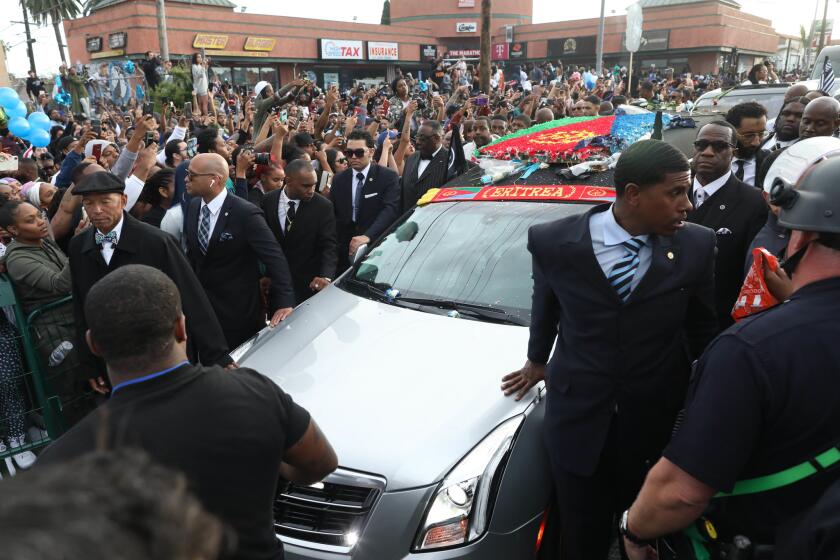He went from gun-toting Crip to peacemaker. But the streets still came for him

Growing up, Garry “Twin” Dorton was a gun-toting Crip. As an adult, he became a full-time peacemaker in his community. In 2018, he was shot and killed in the same neighborhood where he grew up.
- Share via
Garry “Twin” Dorton walked up to his childhood home, past the tree trunks that had shielded him from bullets many a time.
It was about 7 on a summer evening, still light out. Inside, they had given up waiting on him and cut the cake. He said “happy birthday” to his grandmother, ducked into the bathroom and headed out again.
As always, she implored him to go straight home and not hang out.
This was his block of Van Ness, lined with the impossibly tall, wind-bent palm trees featured in movies about South Los Angeles — the backdrop for his heyday as a leader of the Rollin’ 40s Crips, dealing crack, tooling around in a Mercedes-Benz, warring with the Bloods across 48th Street.
The monikers “Big Twin” and “Twin 1” were his birthright for being six minutes first out of the womb. Everyone knew Garry and Jerry, the identical twins from Van Ness, with their reddish hair, heavyset builds, down-to-earth charm and matching “40s” tattooed on their forearms.
In recent years, Dorton had turned from the dark side to good, using his street cred to mediate between rival gangs and mentor young people. At 48, with five children, he had settled into modest prosperity as a gang interventionist for the city with a side gig providing security for TV and film shoots, such as John Singleton’s “Snowfall.”
But there is a hard truth to gang-banging. You can never leave it behind, no matter how cleanly you live.
Something from your past, or a minor conflict from the present, can come back to bite you in a world where people settle their scores with gunfire.
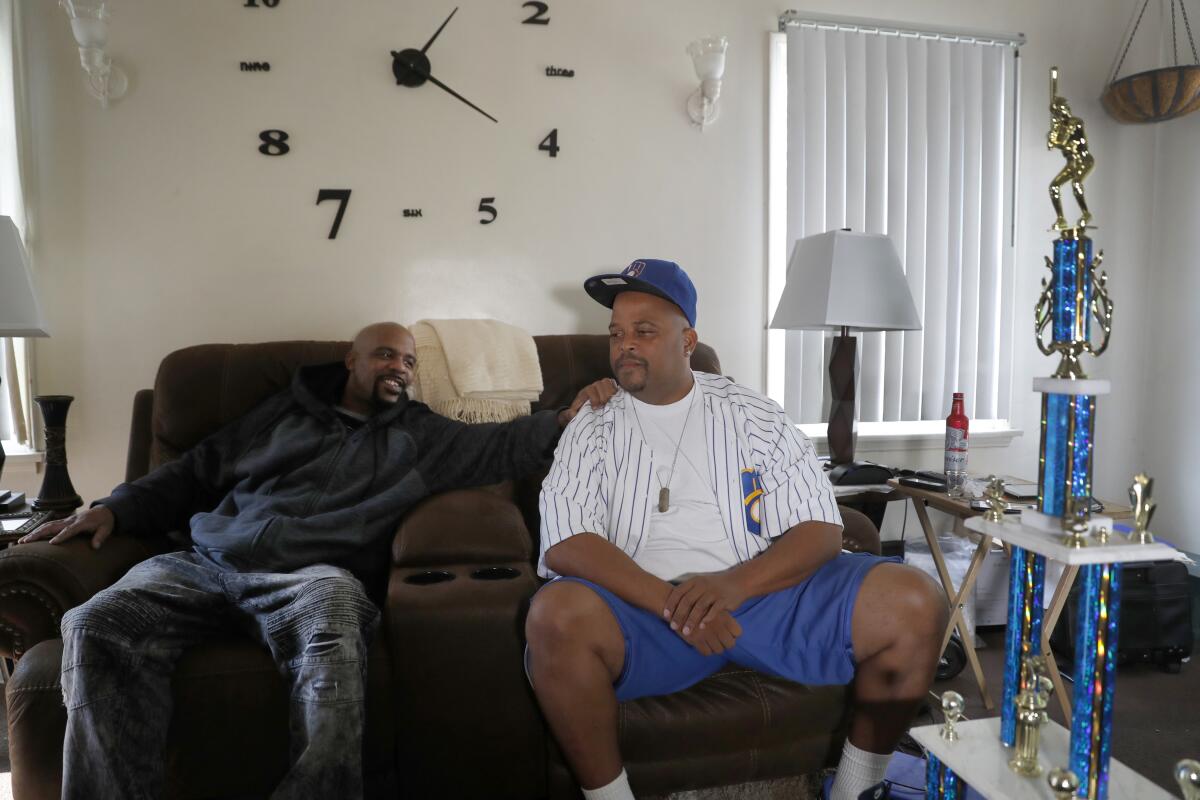
::
Dorton’s milestones growing up were these: First robbery at 12. First drug deal around the same time. Becoming a father at 15.
He knew right from wrong, but right was less glamorous.
Crack cocaine hit the streets of Los Angeles in the early 1980s. The money was easy and the danger close to home. Rivals threw Molotov cocktails into his grandmother’s house and shot up her front door.
“Like lacing my shoes and putting a belt on, I had to put a gun on. That was the way of life,” Dorton said in a 2017 interview with The Times.
But bullets never touched him — not when he took cover behind those palm trees, not when he was cruising on Crenshaw and some Bloods shot at his car, hitting his twin in the arm.
In the late 1990s, as Dorton approached his 30th birthday, the police seemed determined to put him away. His criminal record was sparse — reckless driving, cocaine possession. But they were threatening to slap him with a gang enhancement, which could have meant a long sentence.
It was time to walk away, he decided — not from the neighborhood, not from his friends, but from the road that ended in prison or death.
“They were locking up a lot of people at the time, so we just had to change up,” Dorton said in the 2017 interview. “I got tired of fighting those cases and all that. I said, ‘Well, you know, I’ve got to change, got to go to work, got to go back to school, you know, start doing things like trying to keep it productive.’”
It was awhile before he stopped tucking a gun into his waistband. But his lifestyle gradually shifted. For a time, he and his brother operated a convenience store down the block from their grandmother’s house, using the business acumen they had honed dealing drugs to sell chips and sodas.
Dorton got his GED and took classes at Cal State L.A. In his spare time, he offered guidance to young people and became a familiar presence at community events.
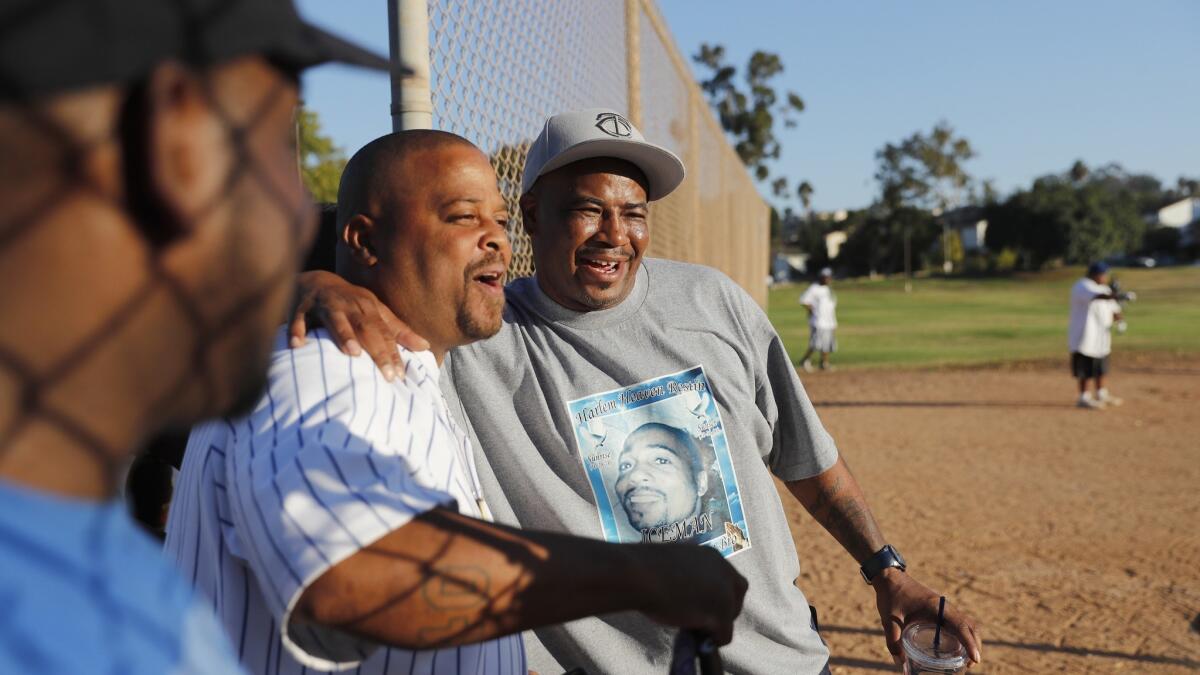
Four years ago, he scored a full-time gig as a foot soldier in the mayor’s Gang Reduction and Youth Development Program.
When Dorton’s phone buzzed in the middle of the night, it was usually a notification from the city that someone had been shot.
He would throw on some clothes and rush to the scene to comfort friends and relatives, tamp down rumors about who did it, talk people out of retaliating.
Only high-status “Original Gangsters” were qualified for the work. These were men who had lived the violence of the 1980s and 1990s, when annual homicides in the city topped 1,000. These were men who had seen friend after friend die or go to prison for life and wanted to steer young people away from similar fates.
On these streets, seemingly minor conflicts — an unpaid debt, a contested parking space — could mushroom into violence. Dorton convinced people that it was strong, not weak, to let a slight go.
And there were the kids who still had a chance to avoid the mistakes he had made, who occupied his afternoons and weekends with fishing trips, pep talks, heart-to-hearts with their parents.
The mayor and the police chief often touted gang intervention as a major reason why homicides and shootings were down in South L.A. The work was all-consuming, and it could be dangerous.
Peacemakers are generally considered off-limits in gang warfare. But it is inherently risky to put yourself in the middle of angry, armed factions, to work with both police and gang members, to navigate complex gang politics where one misstep could be fatal.
But Dorton stayed in the mix. Only by turning young lives around could he atone for his lost years.
::
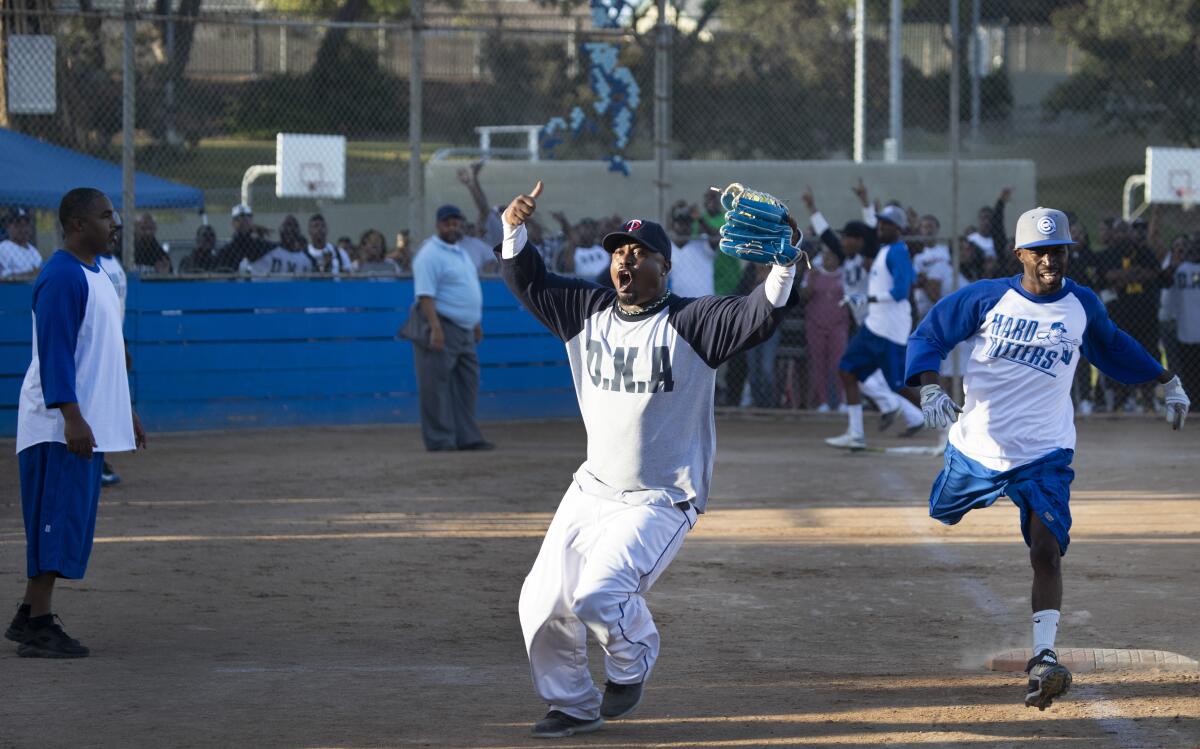
In the summer of 2018, the Rollin’ 40s were contenders for the Crips softball championship once again.
On July 1 at Peck Park in San Pedro, they clobbered the Rollin’ 90s, 48 to 5. As the slate of games wrapped up, spectators packed up their picnic gear and headed home.
The league had been a passion for Dorton since he brought in the 40s as one of the founding teams in 2016. It was an ambitious peacemaking effort, using sports to cement the tentative goodwill among Crip gangs, which more or less got along but were always at risk of flareups that could erupt into full-blown wars.
Many of the players were middle-aged and no longer actively gang-banging. Like Dorton, they still identified strongly with their gang but wanted that affinity to represent something positive. They wanted to set an example for the young people who came to watch the ballgames.
Plus, it was just plain fun to suit up with the homies and represent the neighborhood, trying to outplay and out trash-talk one another.
“Hopefully, one day when I get old with a cane and sit in the bleachers, they’re playing, you know,” Dorton said of the young spectators.
Dorton had stepped back from the league to answer the call of work and family on weekends. But he still attended the games when he could.
He was there that day at Peck Park when Xavier “Chico” Guerrero, a Rollin’ 60s OG, showed up.
The 60s were at war with the 40s, so they were not allowed to join the league or even attend the games as spectators.
Some 40s asked Guerrero to leave. The talk grew heated, and he retreated.
It is unclear what role Dorton played in the altercation. On the phone with his fiancee later that day, he mentioned an incident at the game. “I’ll tell you when I get home,” he said.
After stopping to offer birthday greetings to his grandmother, Dorton drove up the block to his longtime friend Tamajon Jackson’s house, where members of the Rollin’ 40s often congregated.
::
Dorton’s grandmother, Eula Montgomery, had long urged him to leave the neighborhood. She knew trouble could still find him. But he lived around the corner and stopped by to see her almost every day.
He was a man who planted his roots deep and tended them carefully, who loved barbecuing for a large crowd and arguing vociferously with his brother over trivial matters like the songs on a Mary J. Blige album.
In his youth, he had channeled that loyalty into a culture where men took up arms for one another and a slight against one was a slight against all. One person may have pulled the trigger, but everyone from that gang was to blame. One person may have been disrespected, but his allies all felt the same thirst for revenge.
“Anytime you lose a loved one, you blame everybody, you know — whoever you don’t get along with,” Dorton said in 2017.
That ethos still burned strong in the next generation of gang members, from the young men Dorton tried to set straight to the thousands of others he had never met.
::
Dorton was standing by his truck in Jackson’s driveway at 7:30 p.m., chatting with friends, when a black Mazda sedan stopped in the middle of the street.
Two young men got out, both armed with handguns, and began shooting.
A bullet hit Dorton in the back of his left shoulder, piercing his heart and lungs and coming to rest in his liver. A man standing near Dorton was critically injured.
By the time paramedics arrived, Dorton had no pulse. They performed CPR on him throughout the 12-minute ambulance ride. At 8 p.m., minutes after he arrived at the hospital, a doctor pronounced him dead.
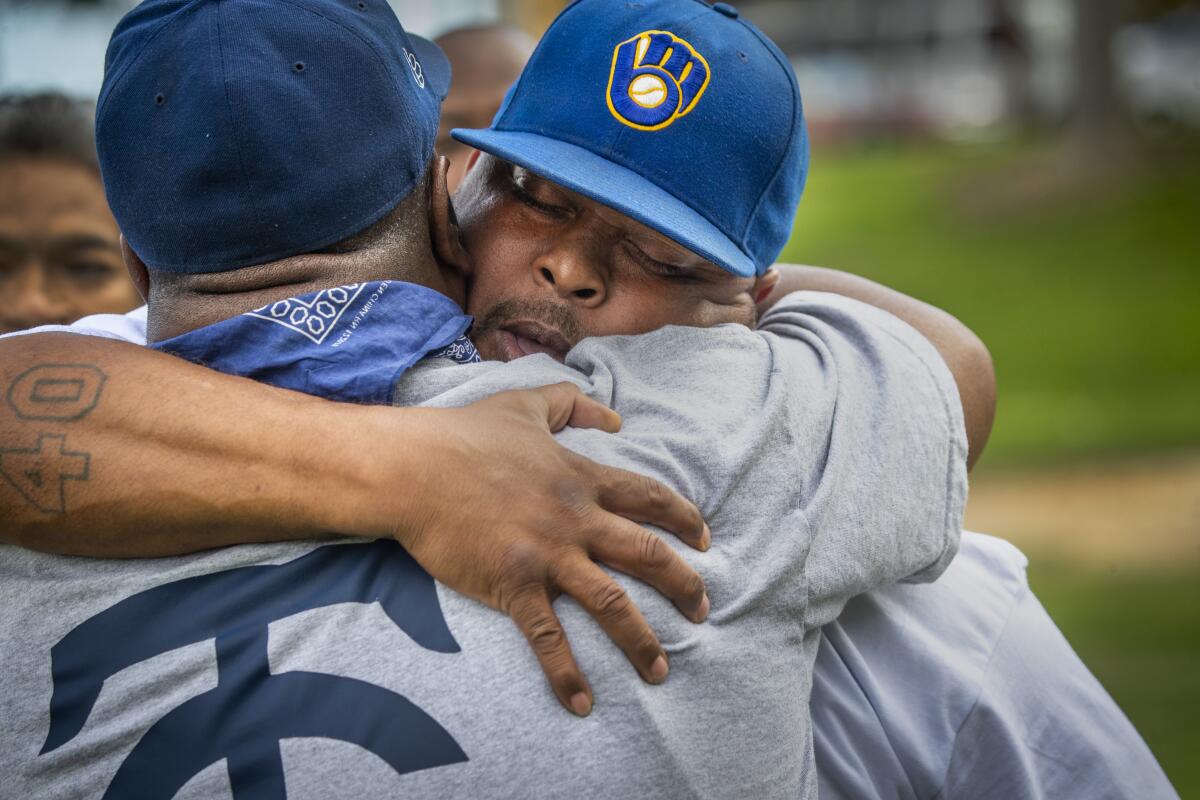
Dorton’s funeral drew an unlikely crowd, but one that reflected his work as a peacemaker — gang members from all over the city, including mortal enemies of the Rollin’ 40s, like Bloods and Hoovers, as well as a representative from Mayor Eric Garcetti’s office.
Kevin “Twin” Orange, a gang interventionist from the Hoovers who worked closely with Dorton and whose own identical twin had died in gun violence, addressed Jerry “Twin 2” Dorton.
“To lose a twin is like losing another half of your soul,” he said.
Within weeks of Dorton’s death, police arrested a member of the Rollin’ 60s.
Brandon Dixon’s GPS monitor, affixed to his ankle because of a previous crime, placed him at the shooting. Surveillance video from a nearby business showed that he was behind the wheel of the black Mazda.
Dixon, 22, was charged with murder, attempted murder and other related crimes. The alleged gunmen in the car with him — Dejone Wright, 20, and a juvenile whom The Times is not naming — also were arrested and charged.
As the Rollin’ 40s mourned Dorton’s death, retaliation seemed a real possibility.
Dorton’s friends were outraged that he was targeted, when he should have had immunity as a noncombatant.
“It’s not like he’s doing anything to harm anybody there,” said Berniel “Blue” Garrett. “If he’s in an opposing community, he’s there to save lives.... Why go after our peacemaker?”
They quit the softball league. Their hearts were too heavy, and they worried that more violence could break out.
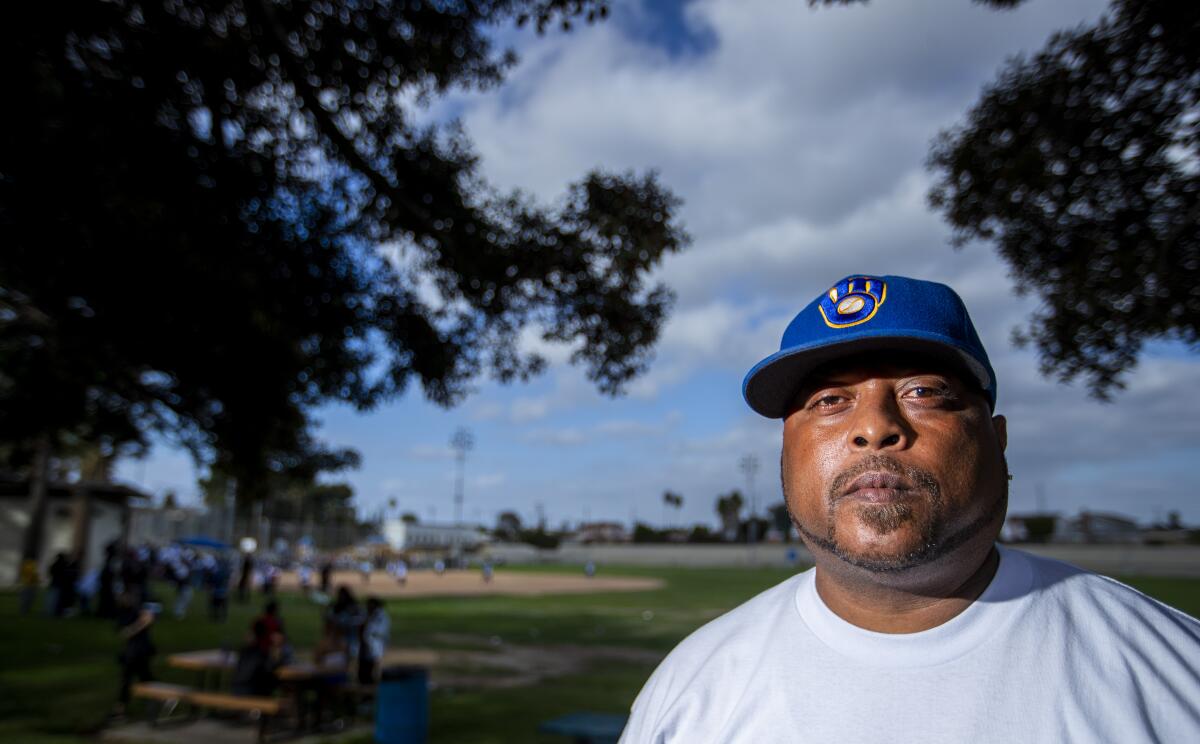
‘For him to die now, when growing up, he dodged all of that — it’s senseless.’
— Jerry “Twin 2” Dorton, on his late brother
Dorton would not have wanted any blood spilled on his behalf, the 40s knew. For the most part, they did not channel their grief into revenge.
But with Dorton’s death, the enmity between the 40s and the 60s grew deeper.
It took the killing of another gang member turned do-gooder, the rap star and Rollin’ 60 Nipsey Hussle, in March, for the two sides to broker a fragile cease-fire as part of a wave of gang peacemaking that swept the city.
Forgiveness was not necessary, only an understanding that the killing would stop. It was what Hussle and Dorton would have wanted.
About a week before Nipsey Hussle’s death, I was watching these YouTube videos about L.A. gangs on Street TV and Kev Mac Videos, channels with more than 270,000 combined subscribers and several million views.
Dixon, the driver of the black Mazda, told his version of events to detectives.
Guerrero, the Rollin’ 60s OG, had told Dixon and his friends about the dispute at the softball game. Dixon admitted to cruising past the house on Van Ness, where he recognized Dorton standing in the driveway. But Dixon insisted they went there to buy codeine from a Rollin’ 40, not to avenge their big homie.
As they pulled up, a tall man with glasses approached the car and tried to shoot them, according to Dixon’s account. But the gun jammed.
Dixon said he didn’t know his two companions were armed until they got out and began spraying bullets, while Dixon stayed in the car.
Questioning a witness at a hearing in May, a prosecutor elicited a possible motive for the gunfire: a young gang member might want to impress his elders by acting on their behalf.
The witness, an LAPD gang expert, dismissed the notion that a Rollin’ 60 would go to a Rollin’ 40s hangout to purchase codeine.
Jerry Dorton sat in the small downtown courtroom, yards away from Dixon and Wright, wearing a T-shirt with a photo of his brother and him as babies in identical white tops and red shorts.
“Two of a kind, 1970 — 2018,” the shirt said.
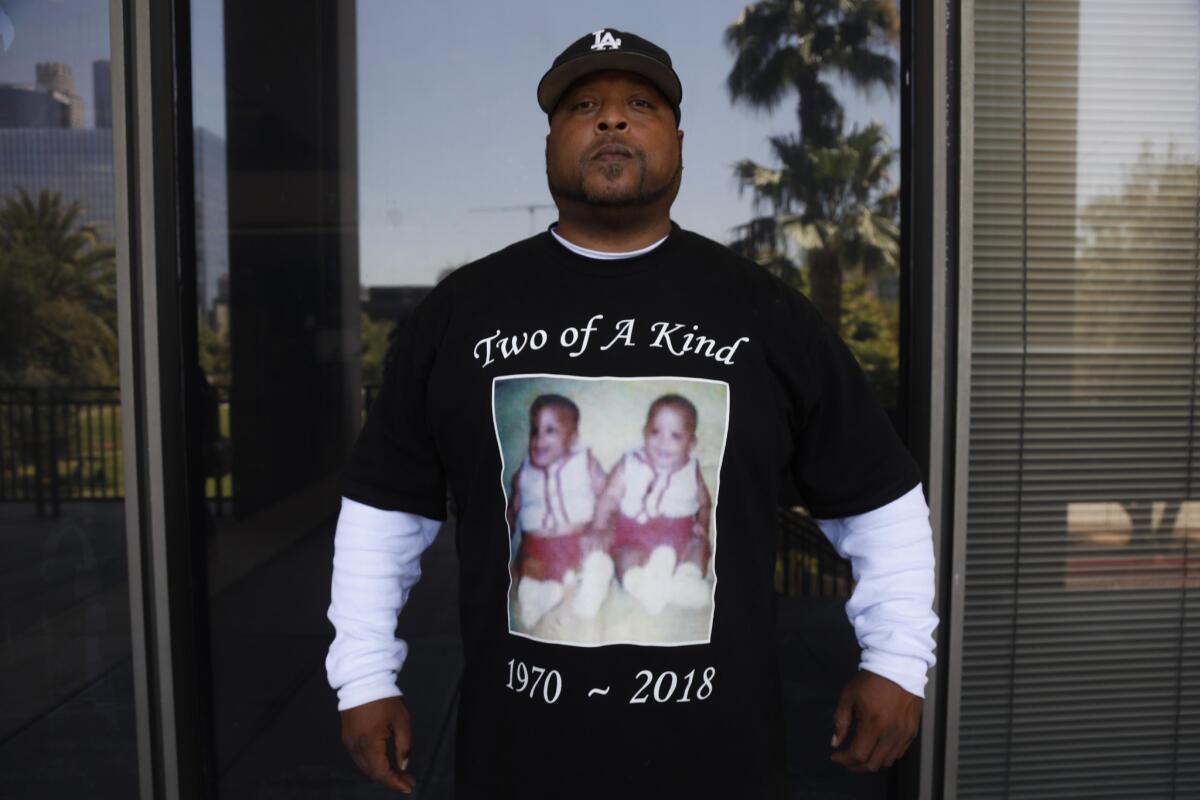
Dixon’s attorney, Ludlow Creary II, argued that the young men acted in self-defense after the tall man pulled the gun on them. But the judge ruled there was enough evidence to send them to trial.
Guerrero could not be reached for comment. Attorneys for Dixon and Wright declined to comment.
A date for the trial has not yet been set. The third defendant’s case is being handled separately in juvenile court.
These young black men were from the very demographic Dorton was trying to help, living the same life he had once led. The irony weighed heavily on his family and friends.
“For him to die now, when growing up, he dodged all of that — it’s senseless,” his brother Jerry said. “Those kids — I used to be those kids.”
At an earlier court hearing, Dixon and Wright stood handcuffed in a glassed-in holding booth. Wright spotted Jerry Dorton sitting in the audience. He shot a sidelong look at Dixon, and both stole glances at Dorton, who stared back hard.
It was the face of the man they had allegedly sent to the grave, etched with a grief his brother had never known.
Times video journalists Claire Hannah Collins and Jessica Q. Chen contributed to this report.
More to Read
Sign up for Essential California
The most important California stories and recommendations in your inbox every morning.
You may occasionally receive promotional content from the Los Angeles Times.
